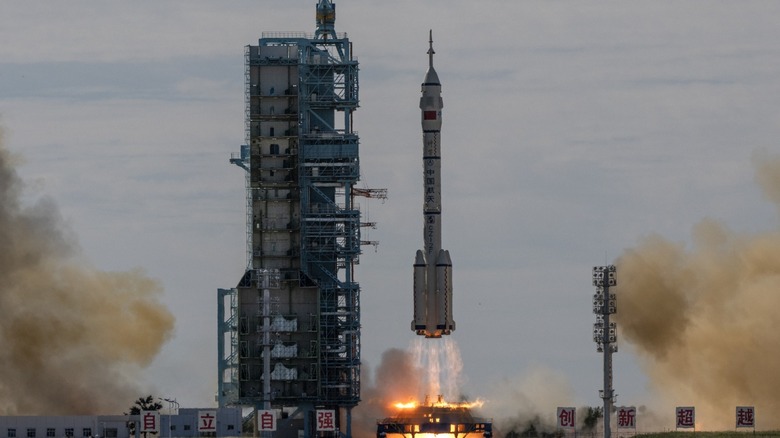How Deadly Is Falling Spacecraft Debris?
CNN reports that a Chinese rocket is expected to fall to Earth around August 1, but how much of a danger does it pose? The rocket in question was used to deliver the new Wentian laboratory module to China's space station, Tiangong, which is now nearly complete. The first part of the station — its living quarters — was launched last year. The last part, another lab, will likely be launched later this year. The Wentian lab will be used for biological and life science research (via Yahoo! News).
The delivery rocket took off from Hainan Island, China, on July 24, and successfully reached its destination. It is now falling back to Earth uncontrolled. U.S. Space Command and the U.S. military are tracking it but can't yet be sure of exactly where it will land. That can't be determined until a few hours before it reenters Earth's atmosphere. Right now, it's expected to land within 41 degrees latitude of the Equator, either to the north or south, according to CNN.
China's handling of space debris
Because this rocket's descent is uncontrolled, it poses more of a risk than most falling space debris. CNN says this is the third time China has been censured for the dangers posed by its space debris. Modern technology can control the descent of a spacecraft back to Earth, including where it lands. Usually this type of debris is directed to remote ocean areas. However, when the first module of China's space station was launched last year, its remnants were also uncontrolled and fell into the Indian Ocean, near the Maldives, after about 10 days. In 2020, a 20-ton Chinese rocket core fell to Earth uncontrolled and passed directly over Los Angeles and Manhattan before crashing into the Atlantic Ocean.
NASA heavily criticized both situations. China's response was that the U.S. was simply fear-mongering.
China has had other recent troubles associated with their space program, including two failed launches in 2020. Nonetheless, they hope their space station will replace the International Space Station (ISS) after the latter is decommissioned in 2031. Chinese astronauts are currently not allowed on ISS (via Yahoo! News).
The risk to humans from space debris
Most of the 23-ton Chinese rocket will break up and burn after hitting the Earth's atmosphere. Only larger pieces are expected to reach Earth's surface, according to CNN.
Falling space debris typically poses little threat to humans, but the risk is increasing as the amount of "junk" in space increases. The threat is higher in the Global South, because space debris is more likely to land there. The Economic Times cites a study published at Nature Astronomy, indicating that the increased number of rocket launches (and reentry) leads to an uptick in the odds of a fatality from falling man-made space debris — "there is a 10% chance of one or more casualties over the next decade, on average."
However, according to the South China Morning Post (posted at MSN), there are no reports so far of any human being injured by falling, man-made space debris. Harvard astrophysicist Jonathan McDowell says the probability of space debris falling to Earth and hitting a person is one in a few billion. In comparison, the probability of a person being struck by lightning at some point in life is one in 12,000 (via MSN). Therefore, falling space debris is generally considered non-deadly. Michael Byers, a Canadian professor who studies space debris, says bigger pieces of this rocket could still cause problems if they land in inhabited areas (via CNN). The American 18th Space Defense Squadron will have daily updates about the rocket's location.


